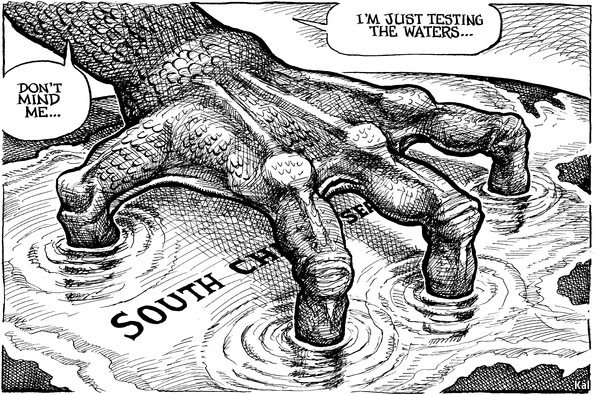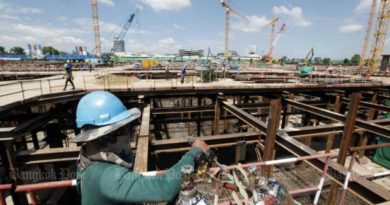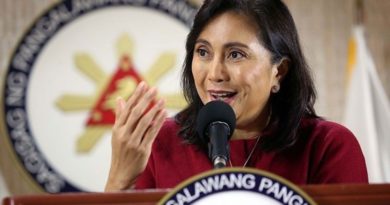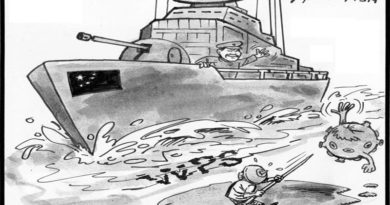OP-ED COLUMN: NEWSSTAND – Jet ski joke aside, is Duterte a traitor? By John Nery
Associate Justice Francis Jardeleza used last week’s House justice committee hearing on the impeachment complaint filed against Chief Justice Maria Lourdes Sereno to deliver a counteraccusation three years in the making: He asserted that it was Sereno, not he, who had committed acts of treason during the preparation of the (successful) Philippine arbitral case against China. He was responding to Sereno’s erroneous claim, in 2014, that then Solicitor General Jardeleza’s policy position on the South China Sea dispute, specifically on Itu Aba in the Spratlys, was disloyal to the country.
Lost in this unfortunate “spectacle of diminishment,” as an Inquirer editorial described the sorry appearance of one retired and three incumbent Supreme Court justices at the hearing, is any appreciation of the present reality: Under President Duterte, and despite the sweeping landmark ruling of the arbitral tribunal in 2016 in favor of the Philippines, the country’s rightful claims to the West Philippine Sea, to parts to the Spratlys and to Scarborough Shoal are at their weakest in decades. Indeed, Mr. Duterte has deliberately weakened them. Clearly, both Jardeleza and Sereno (and Senior Associate Justice Antonio Carpio, who shared Sereno’s dim view of Jardeleza’s position in 2014) support the arbitral tribunal ruling and want to see it implemented. If they want to accuse anyone of treason, of yielding to the Chinese, perhaps they should point their finger at the President.
But there is a difference between a serious policy disagreement and treason. As I argued in “‘While there is peace there can be no traitors,’” in August 2014, Jardeleza, Sereno and Carpio were wrangling over only a dispute (admittedly highly consequential) in policy; the use of “treason” was an overreach.
– UR ADVERTISEMENT HERE –
Can President Duterte then be accused of committing acts of disloyalty to the country, when all he did was implement a new, accommodationist policy to China?
Official policy has certainly changed under Mr. Duterte. It began, mere weeks after he took his oath of office, when he ordered a “soft landing” for the overwhelming Philippine victory at the arbitral tribunal. (I was one of those who supported what I then thought of as an initial response, as a way to create room for Beijing to save face.) But over time, it has become clear that the President does not believe in the power of the (compelling) arbitral tribunal decision (or “award”) to get itself accepted as a matter of international law. He has said, again and again, that the choice he faces is between implementing the decision and war.
For instance, last May, after meeting Chinese President Xi Jinping in Beijing on the sidelines of an international summit, he said he told his counterpart that the Philippines was going to drill for oil in a disputed part of the South China Sea, as allowed by the decision. “His response to me, ‘We’re friends, we don’t want to quarrel with you, we want to maintain the presence of warm relationship, but if you force the issue, we’ll go to war.’”
It is important to note that no Chinese government agency has confirmed President Duterte’s version of the exchange. But whether he was more candid than is usual in these diplomatic meetings, or gave an interpretation of Xi’s remarks that was more bellicose than what was actually said, it confirms the view that he thinks of the South China Sea dispute only in black or white: diplomacy or war.
The arbitral tribunal’s award itself is proof that there is a third way open to smaller countries: binding international law. Carpio, in his comprehensive book on the South China Sea disputes, notes at least three instances where smaller countries were able to extract substantial compliance from Russia, Great Britain, and the United States after similar awards. But in Mr. Duterte’s simplified view, China is militarily superior; everything else follows from that fundamental reality.
So much for the presidential candidate’s bravado, when he pledged to ride on a jet ski to the Spratlys to plant the Philippine flag; and so much for the unprecedented opportunity offered by the arbitral tribunal decision to force Beijing to follow the law. Mr. Duterte, the first lawyer-president since Ferdinand Marcos, does not in fact believe in the power of the law; rather, he believes that law serves power — even if that power emanates from Beijing.
His soft landing has turned into a Chinese beachhead.
On Twitter: @jnery_newsstand
COURTESY:
05:11 AM December 19, 2017
NOTE : All photographs, news, editorials, opinions, information, data, others have been taken from the Internet ..aseanews.net | [email protected] |
For comments, Email to :
D’Equalizer | [email protected] | Contributor.










